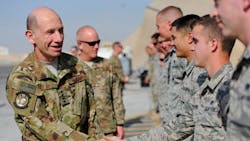Air Combat commander not ready to trust airmen's lives to Project Maven’s artificial intelligence — yet
WASHINGTON – Gen. James Holmes, commander of U.S. Air Force Air Combat Command, isn’t ready to trust his young airmen’s lives to artificial intelligence. Holmes told the Defense Writers Group he doesn’t “think we’re there, at the point where we’ll turn it over to the machines.” Breaking Defense reports. Continue reading original article
The Military & Aerospace Electronics take:
23 Aug. 2019 -- The way Project Maven works is, "it’s like your three-year-old plays with his iPad,” Holmes told reporters. The child looks at one image after another and says, “It’s car, car, car, not car,” the general says.
This abiding skepticism has long been one of the greatest obstacles for the effective use of artificial intelligence (AI) by the armed forces, which — despite their massive investments in research — have a strong streak of technological conservatism when it comes to trusting new technology with human lives.
Holmes was careful to note that the Maven algorithms are training themselves and getting better and better, which is exactly what machine learning is supposed to do: Feed the system more and more data and it gets better at what it’s supposed to do.
Related: DARPA artificial intelligence project aims to help humans and machines get along better
John Keller, chief editor
Military & Aerospace Electronics
